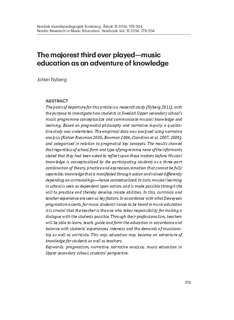| dc.description.abstract | ABSTRACT. - The point of departure for this article is a research study (Nyberg 2011), with the purpose to investigate how students in Swedish Upper secondary school’s music programme conceptualize and communicate musical knowledge and learning. Based on pragmatist philosophy and narrative inquiry, a qualitative study was undertaken. The empirical data was analysed using narrative analysis (Kohler Riessman 2005; Bowman 2006; Clandinin et al. 2007, 2009), and categorised in relation to pragmatist key concepts. The results showed that regardless of school, form and type of programme, none of the informants stated that they had been asked to reflect upon these matters before. Musical knowledge is conceptualized by the participating students as a three-part combination of theory, practice and expression/emotion that cannot be fully separable; knowledge that is manifested through action and valued differently depending on surroundings—hence contextualized. In turn, musical learning in school is seen as dependent upon action, and is made possible through the will to practice and thereby develop innate abilities. In this, curricula and teacher experience are seen as key factors. In accordance with what Deweyean pragmatism asserts, for music students’ voices to be heard in music education it is crucial that the teacher is the one who takes responsibility for making a dialogue with the students possible. Through their professionalism, teachers will be able to learn, teach, guide and form the education in accordance and balance with students’ experiences, interests and the demands of musicianship as well as curricula. This way, education may become an adventure of knowledge for students as well as teachers. Keywords: pragmatism, narrative, narrative analysis, music education in Upper secondary school, students’ perspective. | nb_NO |
